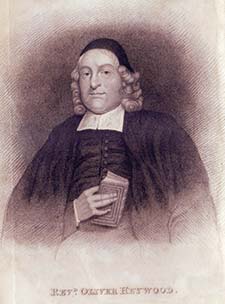Thursday, 19 October 2023
Hebden Bridge Local History Society Report
The melting season: inside the mind of Oliver Heywood
Speaker: Sheila Graham
How do you get inside the mind of someone who has been dead for over 300 years?
 Luckily, the Reverend Oliver Heywood was a keen diarist and Sheila Graham told Hebden Bridge Local History Society how she used lockdown hours to trawl through the strange things he recorded to find a sense of his thoughts and feelings.
Luckily, the Reverend Oliver Heywood was a keen diarist and Sheila Graham told Hebden Bridge Local History Society how she used lockdown hours to trawl through the strange things he recorded to find a sense of his thoughts and feelings.
Oliver Heywood was a Puritan: an English Protestant in the 17th century, when puritans sought to rid the Church of England of Roman Catholic practices. They had strict moral beliefs and were censorious of licentious behaviour. Heywood, with other dissenters, believed that his right and duty to preach came direct from God, confirmed by the excess of emotion he called 'the melting season'.
Heywood was born in Bolton in 1630 to puritan parents and, following education at Cambridge, he was ordained and became the incumbent of the Chapel at Coley in 1650, living nearby in Northowram. With the restoration of the monarchy in 1658, a series of Acts attempted to bring the dissenters back under the control of the bishops and Heywood found himself suspended from the ministry. For many years he travelled throughout Yorkshire to preach. Life was sometimes dangerous; he was even imprisoned for a short time. From 1688 when the reliably Protestant William came to the throne, Heywood's life until his death in 1702 was relatively peaceful.
So what do we learn about him from his diaries? Can we get inside his mind? The diaries were transcribed by a local antiquarian, J Horsfall Turner, in the late 19th century and through them we can get a taste of his thoughts and beliefs.
He was apt to pass judgement on notable men of Halifax whom he thought degenerate, not bland obituaries but incisive and opinionated with a marked preference for scurrilous gossip. 'Charles Best, killed himself with intemperance, degenerated into licentiousness' 'Robert Gledhill, a clipper 'tis said'. He was especially fascinated by sudden death and the horror of facing judgement day unprepared.
Heywood also reported on the behaviour witnessed at events in Halifax, annual celebrations such as Mayday, 'a heathen custom which attracted a number of people of the baser sort, gradually through the day descending into drunkenness and chaos." He was a good storyteller and described events fully but always with his puritanical bias. He was looking for evidence that 'all hell had broke loose' and judgement day was close. Another source of wonder were comets, storms and unseasonable weather that also suggested the end of days.
Heywood was still writing his diaries days before his death in 1702. He had sold his horse and even records the price he got for the surplus hay and a week before his death, writes his will. With his accounts up to date and ready for the judgement, he died. Not for him the ill prepared death: everything was accounted for.
Hebden Bridge Local History Society meets on the second and fourth Wednesday of the month at Hebden Royd Methodist Church, starting at 7.30 pm. Details of the History Society talks programme, publications and of archive opening times are available on the History website and you can also follow the History Society Facebook page.
With thanks to Barbara Atack for this report
See also: the HebWeb History section

